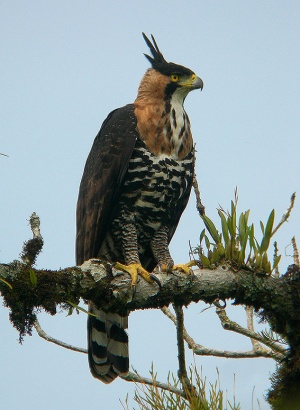(Picture of female. Attempt to disguise some copied text. Taxonomy. References updated) |
m (User template) |
||
| Line 1: | Line 1: | ||
| − | [[Image:Ornate_Hawk_Eagle.jpg|thumb| | + | [[Image:Ornate_Hawk_Eagle.jpg|thumb|500px|right|Adult of subspecies ''ornatus'' <br />Photo by {{user|Douglas+Bolt|Douglas Bolt}} <br />Amazon River , [[Peru]], July 2004]] |
;[[: Category:Spizaetus|Spizaetus]] ornatus | ;[[: Category:Spizaetus|Spizaetus]] ornatus | ||
==Identification== | ==Identification== | ||
Revision as of 19:43, 24 October 2012
- Spizaetus ornatus
Identification
23 - 26 inches, wingspan 3 - 4 feet, weigh 2 to 3 1/2 pounds
- Prominent pointed crest, raised when excited
- Black bill
- Broad wings
- Long rounded tail
- Black crown and upperparts
- Bright chestnut sides to neck and breast
- Black-edged white throat and central breast
- Remaining underparts and feathered legs are white barred with black
- Broad black bars on tail
- White underwings; flight feathers barred grey (as such, the adult is a rather pale bird when seen from below). Wings are narrower near the body and very broad the rest of the way.
Sexes are similar
Young birds are have a white head, crest and underparts, with brown upperparts, and barring only on the flanks and legs.
Distribution
Central America (from southern Mexico) and subtropical and tropical South America including Trinidad.
Taxonomy
Subspecies
Two subspecies are recognized:
- S.o. ornatus:
- Humid tropical northern South America to northern Argentina and Brazil
- S.o. vicarius:
Habitat
Humid forests from lowland swamp forests to higher elevation primary forests. Observed at 1,200 meters.
Gallery
Click on images to enlarge
Adult in flight
Photo by lior kislev
Manu, Peru, January 2010
Behaviour
Diet
Its diet includes medium-sized birds, mammals, and sometimes reptiles.
Breeding
Display flight is rarely seen but includes fast vertical dives as well as U shaped flight where the bird (probably the male?) starts out going down vertically on outstretched wings, gradually bending the path to the bottom of a U and ending up going vertically up, still on outstretched wings. During display, it will call in series of single whistles[2]. Also described is a display where the male and female in flight locks talons with each other[3].
They build a large stick nest on a branch of a tall tree. 1 egg is laid and incubated for 44 - 48 days. The young hawk-eagle will fledge from 9 1/2 - 13 weeks after hatching, but will stay near the nest and be fed by the parents for up to 1 year after fledging. The female Ornate Hawk-Eagle does most of the feeding of the chick while it is in the nest. The male will bring food to within a few hundred feet of the nest and give the food to the female, but usually does not feed the young.
References
- Clements, J. F., T. S. Schulenberg, M. J. Iliff, B.L. Sullivan, C. L. Wood, and D. Roberson. 2012. The eBird/Clements Checklist of Birds of the World. 6th ed., with updates to October 2012. Ithaca: Cornell Univ. Press. ISBN 978-0801445019. Spreadsheet available at http://www.birds.cornell.edu/clementschecklist/downloadable-clements-checklist
- Birdforum member njlarsen personal observations
- Richard ffrench. 1991. A guide to the Birds of Trinidad and Tobago. Comstock/Cornell Paperbacks. ISBN 0-8014-9792-2
- Wikipedia
Recommended Citation
- BirdForum Opus contributors. (2024) Ornate Hawk-Eagle. In: BirdForum, the forum for wild birds and birding. Retrieved 6 May 2024 from https://www.birdforum.net/opus/Ornate_Hawk-Eagle








